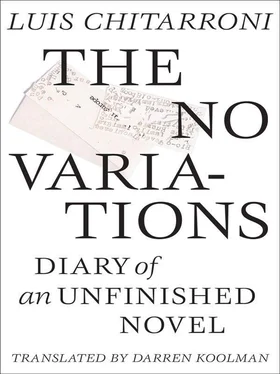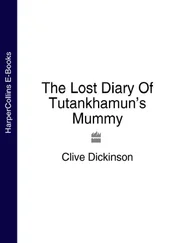None of that exists today (I’ve seen many things that contradict my daring, “transgressive,” claims), but a taste of the era still lingers in my mouth, and that’s strong enough to vindicate all my mistakes … seen immediately.
The cover of that first issue — a tremulous Bogarde at the end of the Fassbinder film, Despair , screenplay by Stoppard, adapted from the novel by Nabokov — exhibited, according to Mario, our paranoia about concealing — reason enough to turn to the inside front cover: photo of Orson Welles in full armor playing his own Macbeth — our omnipotence. Included before without footnote.
Tears shed for the profession
Hilarión Curtis on the quantities and the disasters
6.
Urlihrt lived by his insomnia. The perfect work Nicasio had promised would be divided into two parts, each part in turn divided — like the Goldberg Variations —into thirty-two fragments. Now, the first sixteen chapters would proceed as if up and down eight steps, each step having its own peculiar signs that are met first on the way up, and again, but in reverse, on the way back down. Now, although the number of fragments left by Urlihrt far exceeded the stipulated quantity, no one — not even Lester, Luini, or Urlihrt’s daughter — could make them [that accumulated heap] appear like an orderly collection … The excesses of symmetry lead to the desert of boredom.
His diary ended: this has set its seal upon the age
The old bachelor pays a visit to the dead poet’s library
Soon after publishing my first fictional piece in the journal, Change (“Misery of a Realist,” first extract from Finesse ), I was thought to have risen high enough in the disordered hierarchy of the literary world to be called upon to judge my first short story competition. I read more than a hundred; there seemed to be no end: none were displeasing, but all were unmemorable, except for one, which I remember because I particularly disliked it. It had a title something like, “Diphteria of a Cereal,” and it was a perfect parody of my first piece. I felt the same way I did that time in fourth grade when I entered the classroom and caught L(eporello) imitating me. I never saw myself like that before, but now I saw myself perfectly as I was. There’s something in an imitation, however foolish, that always supersedes the model: imitation is the only advantage left to the featherless biped whose evolution left him with a paltry handicap for racing against any of the quadrupeds. The progress of our steps is always backwards. Barefooted humiliation. Why we can’t justify Bates’s outrage after Maclaren-Ross; or comprehend the spit in the eye that so annoyed Carpentier and Lino Novás Calvo after Cabrera Infante (despite his stating explicitely “Parodio no por odio”).
Look for Ivor Black in The H., V.N.)
Ravel
In defence of the stories, though, one can invoke an extraneous though irrelevant detail. When Oliverio Lester — who’d won various prizes by that time — was judging a short story competition for which he had to read “almost three hundred stories,” he arrived at a curious and exasperating conclusion. All of the stories were populated by similar characters following neatly constructed arcs in neatly constructed fleeting unrealities. As if the contrivance were an instrument or toy for imaginations dominated and constrained by outdated modes, so the arts and trades, occupations and situations described in those three hundred stories Oliverio Lester had read were the same arts and trades, occupations and situations he’d read about in stories from the forties and fifties. The first mawkish scruples prevailed in the realistic narratives — gatekeeper grandfathers, office lovers, tenement suicides, miserable prostitutes with guilty consciences, miserable narrators with guilty consciences, and just plain misery by the bucketload. But even the fantasy tales — encounters with aliens more clever and civilized than ourselves, discoveries of old documents that have a modifying impact on the present time, predictable suspensions of reality for unwelcome forays into the oneiric — arrogantly flouted any implementation, insinuation, or hint of the modern.
So he was determined — roughly a decade ago — to publish a collection much like the one the reader will encounter here, but with a mere exemplary, didactical intention. But then other issues distracted him.
#6 CALUMNIES
Elena Siesta, “Sestina of Departure”
What did our detractors mean when they said “without stories” …?
Nicasio Urlihrt, letter ending on a semicolon
Letter ending on its tippy-toes
What did they mean to say, Don Julio? They meant to say that no one understood what in the world they were talking about or writing. What do they mean to say? They mean to say that all of them, all are just gazing at their navels with the kind of smug self-satisfaction that others find repellant. See, for example, if anyone can understand a word of the discussion regarding Agraphia ’s aporia in “The Mass in Tongues”: there is so much understatement, so many baffling interpolations and obscure references, it would exhaust most normal readers’ curiosity and patience. To know that Duchamp’s nine malic molds correspond to the thirty-six family doctors, and that the number of ocular witnesses weren’t in fact four but three: north and south; that 646416 was the magical cipher in the arcane numerology known to the initiated. One must become familiar with automatic formula for the anagrams and pseudonyms and use it to share ones devotion to cryptic books …
Victor Eiralis, idem
#24
Carelessly, I got used to the idea that paradoxes themselves were acceptable to everyone, and often mentioned them in passing, though I saw no signs of support or even sympathetic smiles around me. But, occasionally, when I was alone, I indulged my superstitious sense of self-importance. Thence, ready to begin my narrative about the cult, or the legion, I remembered that my two favorite stories in English are about sects or lodges: “False Dawn” by Kipling, and “The Primate of the Rose” by M. P. Shiel. But then I realized, after thinking a while about these stories and their themes, that I was wrong: neither of them have anything to do with sects or lodges. Sebastian Birt, Lenten Diary (Diary to Elena)
#8 FAREWELLS
[#27]
Before closing the door on the previous day
[Shortly before Elena sneaked into the background with Bindo, quietly and deftly, so they wouldn’t hear her speak about them, she left a note that was, in both style and substance, the very opposite of a suicide note.]
By doing it so badly, maintaining my distance and calm, and because Remo was there, and because his languid liquid stare made me nauseous. For this and because of my rough and narrow throat (almost all we ever did was smoke). For this and because I knew about Allegra Siri, all of those characters, so to speak, placed at yours and our mercy. Dos, Pimpernel, whoever. And I see I must carry away a flock of adjectives (“every ewe with its mate”). Except they’re not ewes but lemmings. The edge of Agraphia ’s fjord placed by you over there so we don’t fall.
(…) All the stubbornness, the foolishness, the constant betrayal, and the pride — especially in his case. My constantly aching molar seems unjustly to be at his temperament’s disposal. Without justice of divorce, you’ll say. I don’t deserve it when he’s the one to blame. He’d like to be the next presbyobe, the one who pays no attention to the details — not I, the one who stays at home. La plus cruelle absence est celle que l’on peut toucher avec le main . Toulet, apt, isn’t it, considering our arrangement? Remind her of it, whoever she is. The drafts are still there [in Vidt]. If, at some point, Teode wants them back, it’s your duty N. to return them to her. Also, give her those books you merely hoard without bothering to read them. It would help if you collected books instead of women , they said to CC. I [on the other hand] feel incapable of doing either: I have no contempt for books or women, but I’m quite indifferent to collections of them. I only lately understood the impulse: collections, collections. I’m an irregular verb .
Читать дальше












